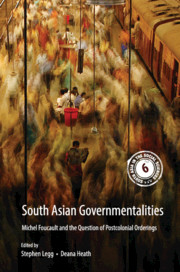Book contents
- Frontmatter
- Contents
- Acknowledgements
- Introductions
- Histories and Presents
- 3 Pastoral Care, the Reconstitution of Pastoral Power and the Creation of Disobedient Subjects under Colonialism
- 4 The Abiding Binary: The Social and the Political in Modern India
- 5 Colonial and Nationalist Truth Regimes: Empire, Europe and the Latter Foucault
- 6 Law as Economy/Economy as Governmentality: Convention, Corporation, Currency
- Subjects and Matters
- Reflection
- Contributors
- Index
3 - Pastoral Care, the Reconstitution of Pastoral Power and the Creation of Disobedient Subjects under Colonialism
from Histories and Presents
Published online by Cambridge University Press: 28 October 2018
- Frontmatter
- Contents
- Acknowledgements
- Introductions
- Histories and Presents
- 3 Pastoral Care, the Reconstitution of Pastoral Power and the Creation of Disobedient Subjects under Colonialism
- 4 The Abiding Binary: The Social and the Political in Modern India
- 5 Colonial and Nationalist Truth Regimes: Empire, Europe and the Latter Foucault
- 6 Law as Economy/Economy as Governmentality: Convention, Corporation, Currency
- Subjects and Matters
- Reflection
- Contributors
- Index
Summary
The prominence of male monastic teachers in postcolonial Indian affairs makes it necessary and productive for scholars of the subcontinent to engage Foucault's genealogy of ‘governmentality’ in a pastorate of souls (Foucault, 2007). Having begun with analyses of how penal regimes (in eighteenth-century European jails, schools and clinics) refashioned the desires, habits, aspirations, beliefs and attachments of those who were subjected to them, Foucault's genealogy addressed a question that plagued many political analysts before – and after – him. This was the matter of the consent of the governed. Foucault's genealogy of ‘governmentality’ – or what he called ‘conduct of conduct’ – grounded such consent in historical practices such as those of the rituals of confession, communion and baptism of the Christian church. These, Foucault urged, produced ‘obedience’ to the ‘political government of men’. In Foucault's analysis, the perfection of such obedience took a long time, between the third and the seventeenth centuries (Foucault, 163–226). After that, an intensification of commerce, urbanisation and other conventionally economic and political forces – to echo Foucault's own ‘minimum of homage to causality and the traditional principle of causality’ (Foucault, 227) – generated and reproduced an obedience for which most Christians (in Western Europe) had been trained.
As Legg (2007) has argued, Foucault was unconcerned with histories beyond the West. Nor were rituals followed by diverse theologically-oriented groups in historic South Asia identical with those of the Christian churches. Yet, even though Foucault did not study the intertwining of pastoral power and political power (Foucault, 2007, 154) in non-Western pasts, the unity of the two extended to the early subcontinent. An identical intertwining of the lay and the ordained (or Foucault's ‘political’ and ‘pastoral’) were named variously dvairajya (in Sanskrit) by Tucci, dyarchy by Ruegg, and a two-law system by Ishihama Yumiko (Cuppers, 2004). Furthermore, though Foucault had referred to ‘revolts of conduct’ in convents of twelfth-century Rhineland and then again in sixteenth-century Spain and France, he had not specified the ways in which such nuns or householder females could also have been members of the pastorate of souls. All the early evidence, however, as well as the testimony of European observers of the seventeenth century, established the centrality of ‘family’ in both monastic and lay communities in the Indian subcontinent.
- Type
- Chapter
- Information
- South Asian GovernmentalitiesMichel Foucault and the Question of Postcolonial Orderings, pp. 58 - 80Publisher: Cambridge University PressPrint publication year: 2018
- 1
- Cited by



